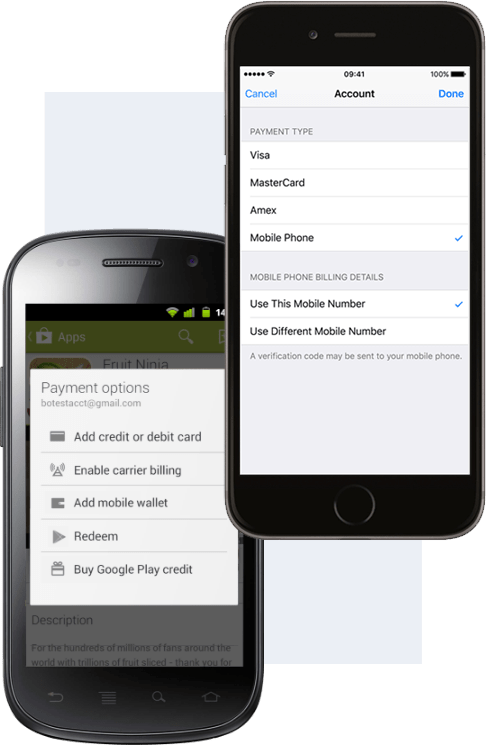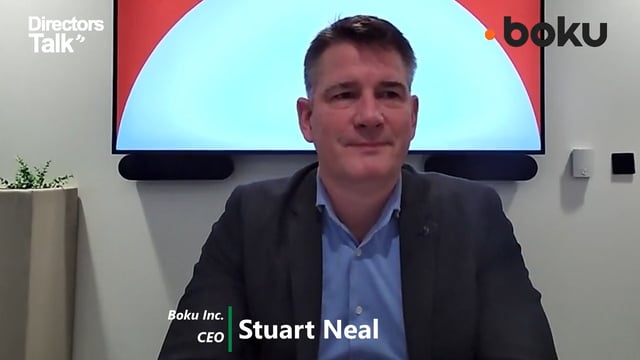Boku Inc (LON:BOKU) Chief Executive Officer Jon Prideaux caught up with DirectorsTalk to discuss highlights from their interim results, e-wallets & real time payments, the contract with Amazon Payments, Chinese opportunity and what we can expect to see in the rest of the year.
Q1: First off, congratulations on today’s interim results. Could you just start by talking us through highlights from the period?
A1: I think the highlights for us have really been strong underlying performance in the business, we saw our total number of monthly active users increase by 22% to 46.3 million users.
Behind the figures, the thing that we’re most pleased about really are some of the validation that we’re getting for our new local payment methods strategy. It didn’t quite happen within the period, but we were able to announce last week that we had a new multi-year contract with Amazon Payments, which is a real validation of the strategy.
Just today, we’re also able to talk about the fact that we’ve had our first launch in China, and all of this underpins, frankly, the stunning growth that we’ve been having in volumes and monthly active users on these new local payment method types; e-wallets and also real time payments where volumes are up about 11 times year on year if you take the first half.
Q2: Efforts into e-wallets and real time payments, they’re certainly being validated. Could you just expand on that for us a little and just explain what it means for the group?
A2: For the group, what it means is moving out of the relatively limited marketplace of direct carrier billing, which is essentially appropriate for certain types of product, principally digital entertainment.
So, the significance of something like realtime payments is you can start undertaking payments for advertising and that’s something that we’ve done with Meta, formerly known as Facebook, where small businesses can buy adverts on the meta platform now through Boku and pay for it with real time payments. This is a market that we really weren’t able to access at all when we were concentrating solely on direct carry billing.
So, these new areas take us into a bigger marketplace, and we’re starting to see that follow through with the very impressive growth rates we’re seeing across those new payment methods right now.
Q3: You mentioned earlier Amazon, so you’ve signed this agreement with Amazon, but could you just tell us a little bit more about the deal and the company’s role in it?
A3: So, the deal, as per the announcement, is initially with Amazon Prime video and it involves a launch of wallets in a number of countries in Africa and particularly within Asia.
Now, the significance of the deal really is we went through a procurement process that lasted well over a year, was extremely competitive, and Amazon selected us in preference to any of our competitors on the merits of our local payment method catalogue and capabilities alone. They didn’t use us for direct carrier billing so this wasn’t a case of an upsell from one type of payment to another, it was Amazon, the world’s largest eCommerce company, taking a look at us as a pure play for local payment methods and deciding that the company that they wanted to work with was us. More than that, they liked it so much that they put in place a structure through warrants that mean that Amazon have the capability of getting warrants up to about 3.75$ of Boku provided that they spend what would really be transformative levels of revenue with us over the next seven years.
So, it’s good for us, it’s real validation of the strategy and we can’t wait to get started.
Q4: The company recently launched into China, the world’s largest e-wallet, Alipay. Can you talk us through this development and how you see the Chinese opportunity?
A4: Well, I talked earlier about how getting into local payment methods brings us into markets with more available market and this is a great example of that. It’s not just moving into new merchant verticals like the advertising I was talking about with Meta and Facebook, it’s also about moving into entirely new territories.
We couldn’t, for regulatory reasons, get into China with direct carrier billing, but here we are taking an existing version – unfortunately they don’t allow us to name them – into China with the world’s largest wallet, Alipay.
I can tell you that although it’s only been live for about two or three weeks, the initial expectations are way ahead of our expectations, and it really is a validation, here we are first time launch into China, with the world’s largest wallet and it’s going incredibly well.
Q5: So, just looking forward then, what else can we expect to see from Boku for the rest of the year?
A5: Continued growth in local payment methods, more launches, hopefully more launches in some of the territories that we’ve been talking about earlier on.
One of the things that we’ve been focusing on is not just doing launches within Asia, but we’d hope to have our first launches within the Middle East, further developments within Africa and also, taking our local payment method approach into Latin America also.
So all of these things are now starting to build up a real head of steam so that most of our growth is coming from the new local payment methods. That’s not to say that direct carrier but isn’t performing. It’s now coming off a period where there was some very tough comparables, and although we have been battling at the nominal level against a sharply appreciating US dollar against all of our major trading currencies such as Japanese Yen, Korean one, Euro, and to a lesser extent GDP, you’ll find that the growth is really start to come through, driven by the efforts in these new local payment methods.
So, yes, we are looking forward to the future with really great optimism.









































